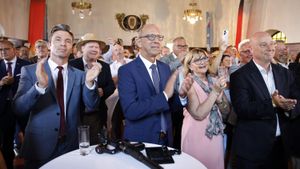On February 23, 2025, Germany will head to the polls for its federal elections, marking a pivotal moment for both the country and Europe. Voters will have the opportunity to cast their ballots from 8 AM to 6 PM, and with around 60 million eligible voters, the stakes couldn't be higher. This election will not only shape the future of Germany but also have significant ramifications for the European Union.
The elections were necessitated by the collapse of the 'traffic light coalition' (composed of the Social Democratic Party of Germany, the Greens, and the Free Democrats) following Olaf Scholz’s loss of confidence last December. The dissolution of the Bundestag occurred on December 27, opening the door for new elections.
A total of 29 out of the 41 parties recognized by the Federal Electoral Commission will vie for seats at the 21st Bundestag. The electoral process employs a mixed proportional representation system, allowing voters two votes: one for local candidates and another for party lists. To secure representation, parties must either obtain at least 5% of the national vote or win three direct mandates.
The leading candidates are vying for the chancellorship, with Friedrich Merz from the Christian Democratic Union (CDU) appearing as the front-runner. Current Chancellor Olaf Scholz of the SPD is facing potential elimination from power, and recent polls denote the rise of the far-right Alternative for Germany (AfD), which could challenge traditional power structures.
According to recent surveys, the CDU/CSU is projected to achieve approximately 30% of the votes, marking them as the leading party. Meanwhile, the AfD, led by Alice Weidel, seems positioned to capture around 21%, significantly increasing their share from the last election.
Scholz, still serving as Chancellor, recognized the tumult of the campaign trail as criticisms of both his leadership and the political climate reverberated. Addressing the public on the eve of the election, he expressed confidence, stating, "I don't believe in miracles, but I believe in victory.” Scholz argued for SPD's continued leadership, positioning himself as best suited to steer Germany through turbulent times.
Merz, who focuses on immigration and economic revival, encourages tighter immigration controls and fiscal cuts. His stance aims to rally conservative voters wary of the AfD’s growing influence and the immigration narrative dominating public discourse. He emphasized the need for Germany to assume more culpability within the EU, advocating structural and economic reforms necessary for national and European stability.
Polls indicate the SPD might garner only about 15% of the votes, showcasing the discontent with the current administration. The Greens are expected to maintain around 13%, with debates surrounding climate policy, defense spending, and socioeconomic reforms taking center stage.
The smaller parties, such as the Free Democrats (FDP), may struggle to surpass the 5% threshold necessary for representation, with the latest projections showing them at approximately 4.5%. Alternatively, the left-wing group 'Die Linke' could land around 8%, reflecting support among younger voters and those prioritizing social issues.
The rise of the AfD has drawn international attention, including endorsements from high-profile figures like Elon Musk, who publicly urged voters to back the party, asserting they present "the best hope for Germany.” The AfD's anti-immigrant, nationalist rhetoric has found resonance among disaffected voters, particularly amid current economic concerns and the aftershocks of Ukraine’s conflict.
Despite Merz's favorable position, observers warn of the difficulties posed by coalition negotiations if no party secures clear majority control.
The election results will not only determine the future government and policy direction but also highlight the increasing fragmentation within the German political system. An expected increase in parties represented could necessitate complex coalition arrangements, complicate legislative procedures, and indicate shifting political landscapes.
With rising inflation and energy crises impacting public sentiment and economic confidence, how voters react to these challenges will be telling. Analysts speculate higher voter engagement might skew results unexpectedly, as apathy or increased fervor post-election debates could influence turnout.
Following the results, anticipated coalition scenarios could range from the CDU/CSU aligning with the SPD or potentially engaging with progressive factions like the Greens for comprehensive governance. The necessity for compromise may reveal divisions within the CDU/CSU’s traditional voter base, as they navigate alliances with parties across the ideological spectrum.
Tomorrow’s electoral outcome promises to reshape Germany's parliamentary future and its overarching role within the EU, as various factions vie for influence and cohesion amid external challenges.



